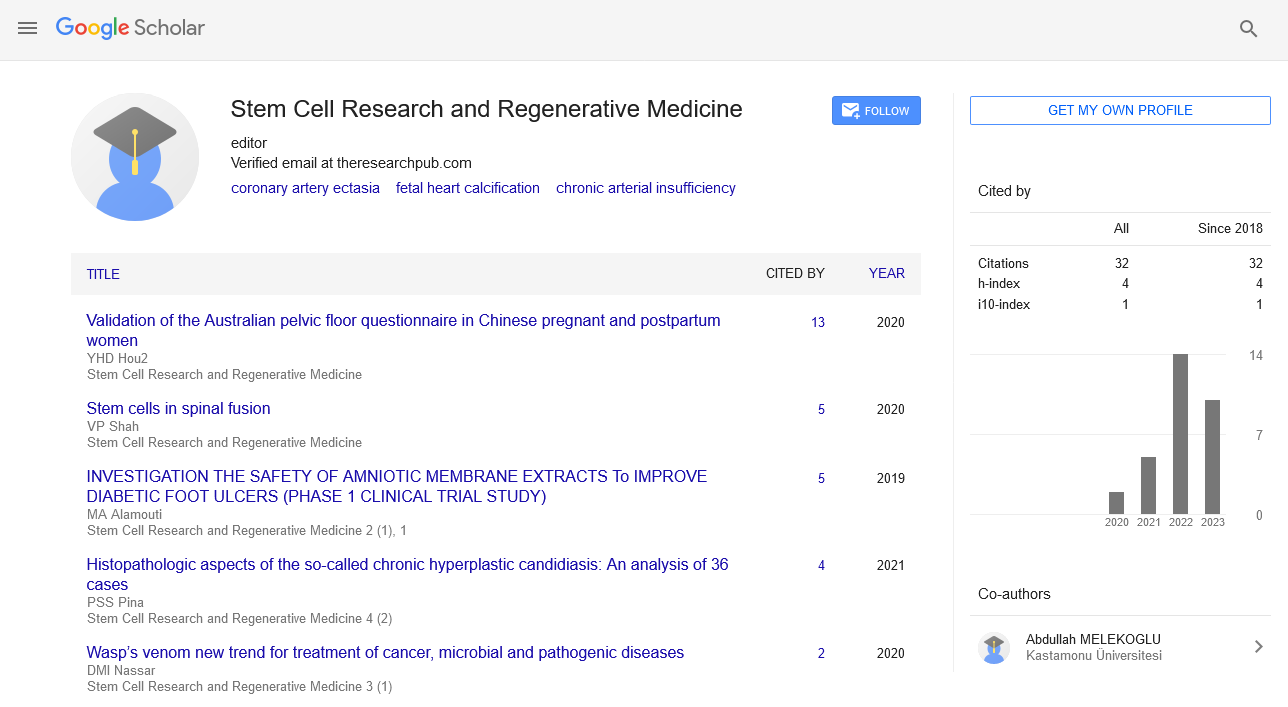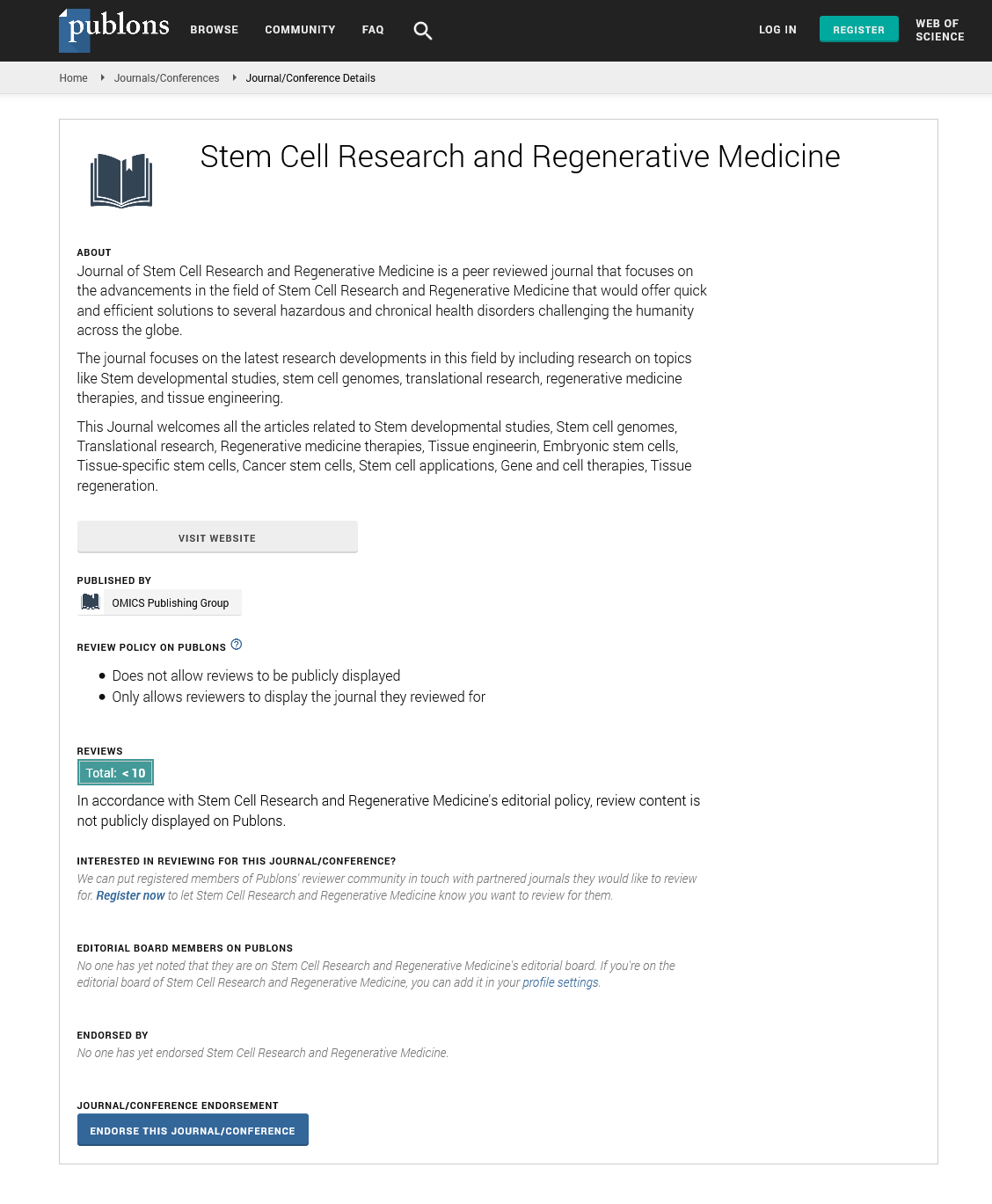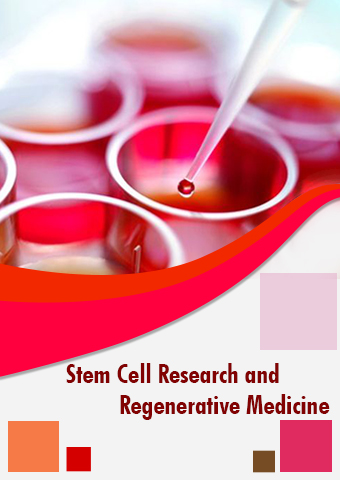Short Communication - Stem Cell Research and Regenerative Medicine (2020)
Cell therapy for multiple sclerosis: the present and the future
Dimitrios Karussis
The Hebrew University of Jerusalem, Israel
Abstract
A novel approach to MS treatment involves efforts for remyelination and regeneration. Due to the limited capacity of CNS for regeneration, infusion of stem cells which carry the potential for regeneration and neuroprotection, may provide a solution for more substantial intervention in progressive neurological diseases. Embryonic cells have strong pluripotent and self-renewal properties and represent the prototype of stem cells, but there are additional somatic stem cells that may be harvested from various tissues during adult life, such as the mesenchymal stem cells (MSC), which offer several practical advantages for clinical application. MSC can be obtained from every adult, are easily expanded to large numbers and carry less risks for malignancies. Our first pilot trial (Phase I/II, 2006-2009) with intrathecal(IT) and intravenous(IV) injection of autologous MSC included 19 patients with ALS and 15 with MS. No major side effects were reported. The mean disability score of ALS (ALSFRS) was stabilized during the 6 first months following the treatment in the ALS patients, indicating a halt of the progression of this severe paralytic disease. In MS patients, the mean disability score (EDSS) showed a clear trend of improvement. A more recent phase I/II and IIa study in our Center, with IT or IM injections of modified MSCs (Brainstorm technology) in 26 ALS patients, revealed that 87 % of the patients treated IT showed an improvement in the rate of progression of either general disability or respiratory function. We have recently completed a large double blind randomised phase IIb trial with MSCs in 48 patients with progressive MS. We used detailed clinical tests, functional MRI, dynamic visual tests and OCT to evaluate the possibility of regeneration/ remyelination. Bone marrow MSCs, prepared using a protocol developed by our team in the “Clean Room” facility of Hadassah were injected either IV or IT (1x106/kg). A third of the participants received placebo. There were two cycles of treatment 6 months apart (crossover design). No serious, treatmentrelated safety issues were detected. Significantly fewer patients experienced treatment failure in the MSC-IT and MSC-IV groups compared with those in the sham-treated group (6.7%, 9.7%, and 41.9%, respectively, p=0.0003 and p=0.0008). During the one-year follow up, 58.6% and 40.6% of patients treated with MSC-IT and MSC-IV, respectively, exhibited no evidence of disease activity(NEDA) compared with 9.7% in the sham-treated group (p<0.0001 and p<0.0048, respectively). MSC-IT transplantation induced additional benefits on the relapse rate, on the monthly changes of the T2-lesion load on MRI and on the timed 25-foot walking test, 9-hole peg test, optical coherence tomography, fMRI and cognitive tests. The IT administration was more efficacious, indicating that the observed effects may be mediated by neurotrophic/ neuroprotective and central immunomodulatory mechanisms. Both our animal studies and our data from this study indicate that the clinical beneficial effects were more significant in patients receiving intrathecally the cells (a method advocated first by our group, so that the cells will reach easier the damaged CNS areas) than intravenously. In my talk, I will summarize the clinical experience with stem cells in neurological diseases, the promise, the hardles and the risks of such experimental therapeutic approaches.
Publications
1. Safety and immunological effects of mesenchymal stem cell transplantation in patients with multiple sclerosis and amyotrophic lateral sclerosis
2. Neuroprotection and immunomodulation with mesenchymal stem cells in chronic experimental autoimmune encephalomyelitis
3. Transplanted multipotential neural precursor cells migrate into the inflamed white matter in response to experimental autoimmune encephalomyelitis
Biography
Dimitrios Karussis, was born in Thessaloniki, Greece on 7-8-1962. He graduated from Aristotelion University of Thessaloniki, Medical school in 1986 with excellency. Since 1988 Prof. Karussis moved and lives in Jerusalem, Israel. He completed at Hadassah his Neurology specialization and his PhD degree. Since 2007 he is the Chairman of the Neuroimmunology Unit and MS Center at Hadassah and the neuroimmunology laboratory. Prof. Karussis has published more than 120 peer reviewed scientific papers, mostly in the field of neuroimmunology and stem cells. He has delivered more than 150 invited plenary lectures and served as chairman in tens of European and world congresses in the field of Neuroimmunology. He serves as ad-hoc reviewer and as member of the editorial board in many major journals. He has been for six years a member of the Executive Committee of the ECTRIMS. Prof. Karussis has pioneered the studies with Linomide and with bone marrow hematopoetic and mesenchymal stem cell transplantation in MS. He is considered one of the world experts in the field of clinical applications of stem cells in neurological diseases. Since 2010, Prof Karussis is the elected President of the Israeli Neuroimmunological society and has organized several International meetings in this field. He has hosted and was President of the International Neuroimmunological meeting in 2016 in Jerusalem.


